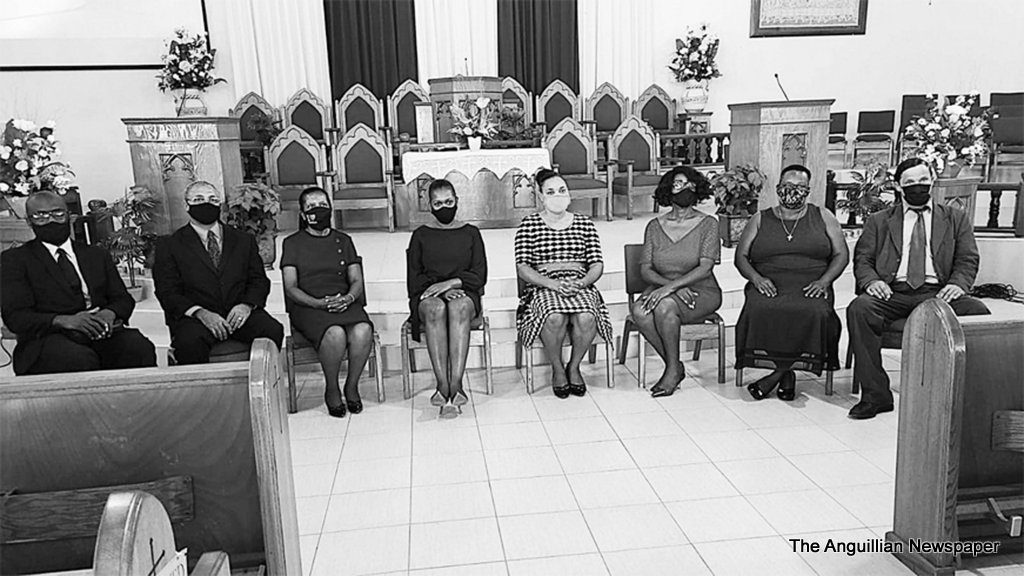
The Mount Fortune SDA Sabbath service of October 30th wasn’t just one of spiritual content, but there was a social aspect to it as well. Members from the Department of Social Development attended to highlight the importance of reaching out to at-risk children who stand in need of foster care homes.
Following the morning’s worship session, the visiting officials were given the opportunity to inform the congregation of their purpose. The group was hosted by Mr. Clive Smith who is a member of the church, and the Senior Community Development Officer in the Department.
The delegates comprised the Commissioner of Social Development, Ms. Loraine Gumbs; the Director, Ms. Daphne Hodge; the Supervisor of Family and Social Services, Mrs. Angelina Carty; and Social Worker, Kerlyn Webster of the Family and Social Services Unit. Also present was a Pat Rogers, a community advocate for foster care.
The Commissioner, Loraine Gumbs, remarked: “We at the Department of Social Development are responsible for taking care of the social problems on Anguilla, which include foster care, domestic abuse, emotional abuse, sexual abuse – and such things as funeral assistance, medical assistance, child maintenance, older persons’ aid, and aid for persons with disabilities.”
“One of our most pressing issues, however, is foster care,” she stressed. “As you know, we have quite a number of vulnerable children in our society, and we are reaching out to persons in our communities to encourage them in doing their part to be a buffer, a guide, and a protector, for these children who may not have such pillars of support in their own homes.”
In the context of foster care, Mr. Clive Smith said that the Foster Care division of the Department is, in itself, a work that can be most fittingly referred to as ‘a ministry’. “From the scriptures, we see that this is God’s work,” he said. “And we are being cautioned by God, Himself, that this work should be done [in our communities].” He led the congregation in the singing of “I’m so Glad I’m a Part of the Family of God”.
Both Mrs. Kerlyn Webster and Mrs. Angelina Carty then made presentations on the social need for foster care. Mrs. Webster equated the emotional storms that children face — without benevolence and security at home — to the fateful storm of Hurricane Irma of September 6th 2017.
She said that the Department of Social Development launched its Foster Care Campaign in February with the theme: “Wanted – Persons to Shelter Children from the Storms”. She emphasised: “These storms include storms of abuse, storms of neglect and storms of abandonment for misfortunate children. Our aim for the campaign was to inform persons about the legislative changes in the Child Protection Act of 2019, as well as to actually recruit foster care parents.”
“The purpose of foster care,” she said, “is to provide a structured temporary placement for children who cannot reside with their mothers or fathers. From time to time, the Department is required to provide wellbeing for infants and toddlers. Children of all ages pass through our hands, including children with disabilities. These children need to be properly cared for.”
Mrs. Carty spoke, particularly, about the standards upon which foster care must be carried out. She said, “Just as everything you do in your work requires certain standards, we have legal grounds that dictate the quality of work that we do in providing homes for children who need them.”
She elaborated on the seven Regional Foster Care Minimum Standards which consist of: 1. Facilitating the provision of a foster care service for children; 2. Recruiting foster care givers; 3. Assessing and approving foster care givers. 4. Training of foster care providers; 5. Supervision and support for foster parents; 6. Sharing information and advice to foster parents; and 7. Conducting an annual review. “The purpose of the annual review, she noted, is just to ascertain that after the first assessment and approval – all favourable circumstances remain unchanged.”
Mrs. Carty reminded the congregation of the rewards of giving care to children, as God expects adults to do. “It is rewarding to us when we give back. Contributing to the development of a child in need,” she said, “provides a benefit for you spiritually, being able to see that child move from one stage of development to the next, in a positive light.”








